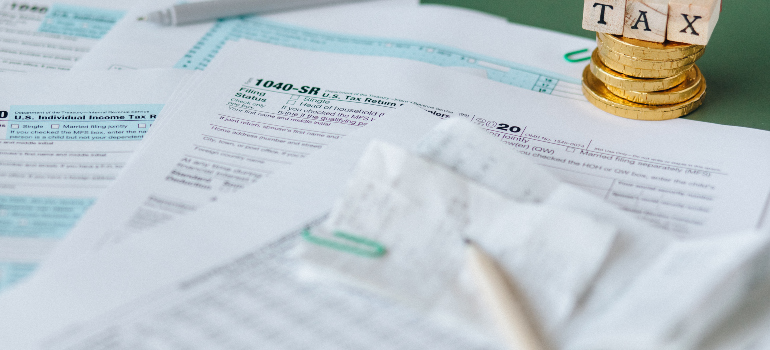Property taxes are an essential aspect of homeownership. Understanding how they work is crucial for anyone looking to purchase a property. For homeowners, understanding how property taxes in Arlington work is essential to managing their finances effectively. However, navigating the intricacies of this annoying obligation we all have can also be daunting for many homeowners. It is important to break down the complexities of property taxes in Arlington, to understand and make informed decisions. Movers DC area locals recommend are at your service after you buy a new home!
What are property taxes?
Before you delve into Arlington’s property tax system and decide on moving to your new home with the help of moving companies Arlington VA has to offer, you should start with the basics. Property taxes are taxes imposed on real estate properties, including land and structures, by the local government. The revenue generated from property taxes is used to finance public services such as education, road maintenance, law enforcement, and more.

The role of assessments
In Arlington, property taxes are based on property assessments conducted periodically by the county. Assessments determine the value of your property, which is a critical factor in calculating your tax liability. The assessment process involves evaluating various factors such as property size, location, age, and improvements. The county’s tax assessors work diligently to ensure fairness and accuracy in assessments.
Property tax rates in Arlington
In Arlington County, the property tax rate is $1.013 per $100 of assessed value, translating to a $5,065 yearly tax on a home worth $500,000. The neighborhood, type of property, and size all have an impact on how much a home costs in the county. Condos in established neighborhoods including Rosslyn, Court House, and Lyon Park often have a listing price between $200 and $900. On the other hand, in areas like Crescent Hills, Berkshire Oakwood, and Fairlington, homebuyers can anticipate paying anywhere from $500,000 to over $2 million for a detached single-family home. If you’re moving to one of these neighborhoods, local movers Northern VA residents rely on will do their best to help you so you’ll have time to focus on other aspects such as taxes.
Exemptions and deductions
Exemptions and deductions are valuable tools that can significantly impact a homeowner’s tax burden in Arlington. These tax benefits are designed to offer financial relief to specific groups of property owners.
- the homestead exemption: it provides a reduction in property taxes for homeowners who use the property as their primary residence. This exemption encourages homeownership and ensures that families can remain in their homes without facing excessive tax liabilities.
- exemptions for senior citizens or disabled individuals: recognizing the potential financial challenges they may face.
- exemptions for veterans: these can show appreciation for their service by providing them with tax relief.
Deductions, on the other hand, allow homeowners to reduce their taxable property value by subtracting specific expenses or improvements made to their property. For instance, home improvements that enhance energy efficiency or promote eco-friendly practices could qualify for deductions.

Appealing property assessments
If you believe that your property has been overvalued in the assessment, you have the right to appeal. The appeal process allows you to present evidence and arguments to contest the assessment. Hiring a professional appraiser or using recent comparable property sales data can strengthen your case. However, you must be aware of the deadlines and procedures for filing an appeal, as missing the window could result in losing the opportunity to challenge the assessment.
Understanding tax due dates
Property tax bills are typically issued annually. It is vital to be aware of the due dates to avoid late fees and penalties. In Arlington, property tax bills are often mailed out in the early part of the year. On the other hand, the payment is usually due before mid-year. Setting reminders or opting for automatic payments can help ensure timely payments and avoid unnecessary hassles. Also, don’t forget to check out when do you start paying taxes on a new home if you’re a first-time homeowner.
Property tax in Arlington- payment options
Arlington offers a diverse range of tax payment options. One of the most popular and convenient methods is online payments. This method allows homeowners to pay their property taxes from the comfort of their homes or on the go. Additionally, you may use credit and debit card payments, providing an alternative for those who prefer using their cards for transactions. For those who prefer traditional payment methods, mailing checks or money orders is still an option, though it may require additional time for processing and delivery. Moreover, Arlington may also offer automated payment plans. These plans allow homeowners to set up recurring payments, ensuring that taxes are paid on time without manual intervention. This option is particularly beneficial for busy homeowners or those who want to avoid missing payment deadlines.

The impact of property improvements
Making improvements to your property can increase its assessed value and subsequently affect your property tax liability. While renovations can enhance the value of your home, it’s essential to consider the potential tax implications. Understanding how improvements affect your property’s value will help you plan accordingly and avoid surprises on your tax bill.
Tax planning strategies
Proactive tax planning can be beneficial in managing your property tax burden. For instance, timing significant property improvements strategically can help spread out the tax impact over several assessment periods. Additionally, staying informed about potential changes to property tax laws and taking advantage of available tax credits and incentives can be great for homeowners. Move planning is also very important. You should plan in advance and think about many details. If you own delicate items, such as the piano, hire professional piano movers Northern Virginia has to offer and enjoy a stress-free relocation.
Navigating Arlington’s property tax landscape with confidence
Navigating the property taxes in Arlington doesn’t have to be overwhelming. Grasping the fundamental components of property taxes, including assessments, millage rates, and exemptions can help you to take charge of your property tax liability. Always stay informed about due dates, appeal opportunities, and available tax planning strategies. Armed with this knowledge, you can confidently navigate the property tax landscape in Arlington and make informed decisions as a responsible homeowner. Whether you’re a seasoned homeowner or a first-time buyer, this information will empower you to decode property taxes in Arlington successfully.


